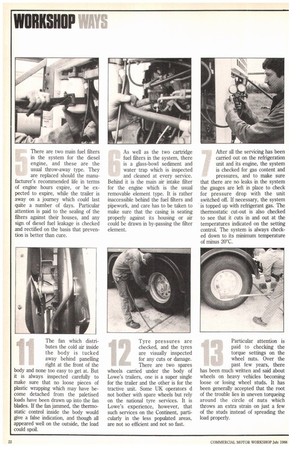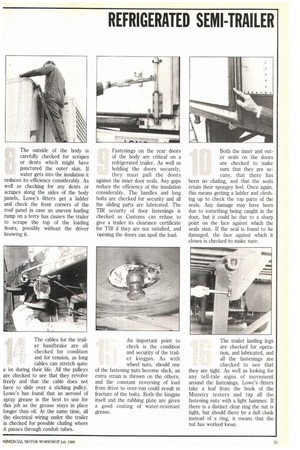WORKSHOP
Page 128

Page 129

If you've noticed an error in this article please click here to report it so we can fix it.
There are two main fuel filters in the system for the diesel engine, and these are the usual throw-away type. They are replaced should the manu facturer's recommended life in terms of engine hours expire, or be expected to expire, while the trailer is away on a journey which could last quite a number of days. Particular attention is paid to the sealing of the filters against their houses, and any sign. of diesel fuel leakage is checked and rectified on the basis that prevention is better than cure.
The fan which distributes the cold air inside the body is tucked away behind panelling right at the front of the body and none too easy to get at. But it is always inspected carefully to make sure that no loose pieces of plastic wrapping which may have become detached from the paletised loads have been drawn up into the fan blades. If the fan jammed, the thermostatic control inside the body would give a false indication, and though all appeared well on the outside, the load could spoil. As well as the two cartridge fuel filters in the system, there is a glass-bowl sediment and water trap which is inspected and cleaned at every service.
Behind it is the main air intake filter for the engine which is the usual removable element type. It is rather inaccessible behind the fuel filters and pipework, and care has to be taken to make sure that the casing is seating properly against its housing or air could be drawn in by-passing the filter element.
Tyre pressures are checked, and the tyres are visually inspected for any cuts or damage. There are two spares wheels carried under the body of Lowe's trailers, one is a super single for the trailer and the other is for the tractive unit. Some UK operators d not bother with spare wheels but rely on the national tyre services. It is Lowe's experience, however, that such services on the Continent, particularly in the less populated areas, are not so efficient and not so fast. After all the servicing has been carried out on the refrigeration unit and its engine, the system is checked for gas content and pressures, and to make sure that there are no leaks in the system the gauges are left in place to check for pressure drop with the unit switched off. If necessary, the system is topped up with refrigerant gas. The thermostatic cut-out is also checked to see that it cuts in and out at the temperatures indicated on the setting control. The system is always checked down to its minimum temperature of minus 20`C.
Particular attention is paid to checking the torque settings on the wheel nuts. Over the past few years, there has been much written and said about wheels on heavy vehicles becoming loose or losing wheel studs. It has been generally accepted that the root of the trouble lies in uneven torqueing around the circle of nuts which throws an extra strain on just a few of the studs instead of spreading the load properly. The outside of the body is carefully checked for scrapes or dents which might have punctured the outer skin. If water gets into the insulation it reduces its efficiency considerably. As well as checking for any dents or scrapes along the sides of the body panels, Lowe's fitters get a ladder and check the front corners of the roof panel in case an uneven loading ramp on a ferry has causes the trailer to scrape the top of the loading doors, possibly without the driver knowing it.
The cables for the trailer handbrake are all checked for condition and for tension, as long cables can stretch quite a lot during their life. All the pulleys are checked to see that they revolve freely and that the cable does not have to slide over a sticking pulley. Lowe's has found that an aerosol of spray grease is the best to use. for this job as the grease stays in place longer than oil. At the same time, all the electrical wiring under the trailer is checked for possible chafing where it passes through conduit tubes. Fastenings on the rear doors of the body are critical on a refrigerated trailer. As well as holding the doors securely, they must pull the doors against the inner door seals. Any gaps reduce the efficiency of the insulation considerably. The handles and long bolts are checked for security and all the sliding parts are lubricated. The TIR security of door fastenings is checked as Customs can refuse to give a trailer its clearance certificate for TIR if they are not satisfied, and opening the doors can spoil the load.
An important point to check is the condition and security of the trailer kingpin. As with wheel nuts, should one of the fastening nuts become slack, an extra strain is thrown on the others, and the constant reversing of load from drive to over-run could result in fracture of the bolts. Both the kingpin itself and the rubbing plate are given a good coating of water-resistant grease. Both the inner and outer seals on the doors are checked to make sure that they are secure, that there has been no chafing, and that the seals retain their spongey feel. Once again, this means getting a ladder and climbing up to check the top parts of the seals. Any damage may have been due to something being caught in the door, but it could be due to a sharp point on the face against which the seals shut. If the seal is found to be damaged, the face against which it closes is checked to make sure.
The trailer landing legs are checked for operation, and lubricated, and all the fastenings are checked to see that they are tight. As well as looking for any tell-tale signs of movement around the fastenings, Lowe's • fitters take a leaf from the book of the Ministry testers and tap all the fastening nuts with a light hammer. If there is a distinct clear ring the nut is tight, but should there be a dull clunk instead of a ring, it means that the nut has worked loose.
















































































































































